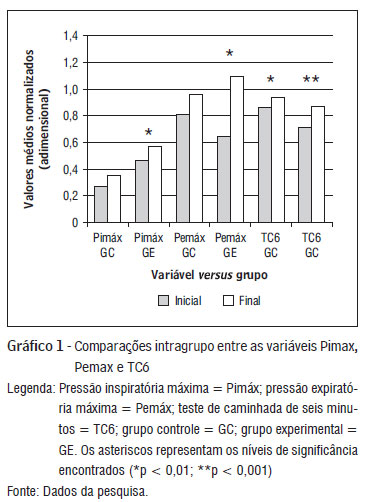INTRODUCTION: Chronic low back pain has a high incidence, large social and personal costs and therapeutic efforts are often frustrating. Is necessary evaluated the physical therapy resources to understand better and substantiating scientifically then. OBJECTIVES: To compare the effects of two physical therapy interventions on respiratory muscle strength (RMS) and functional capacity (FC) in patients with chronic low back pain. MATERIALS AND METHODS: The sample (n = 10) was comprised of patients with chronic low back pain randomly divided into the control group (CG), which received conventional physical therapy (electroanalgesia, massage and stretching), and the experimental group (EG), which received the combined kinesiotherapy (composed of isostretching and aquatic sensoriomotor training). The measurement of the CF test performed by the six minute walk test (6MWT) and the RMS for inspiratory maximal pressure (IMP) and expiratory (MEP) by manovacuometry, which happened before (ΔINI) and after (ΔFIN) interventions, with the duration of seven weeks, three times a week. Comparisons were made by Mann-Whitney and Wilcoxon tests (α = 0.05). RESULTS: The EG showed improvements intra-group in IMP (p = 0.0164), EMP (p = 0.0227) and 6MWT (p = 0.0092), and in the CG, only on the 6MWT (p = 0.018). In inter-group comparisons, it was obtained similar IMP and EMP in ΔINI, but different in ΔFIN (p = 0.0166, p = 0.0045) and in the 6MWT, there was significant difference only in ΔINI (p = 0.0484). CONCLUSION: Isostretching and sensoriomotor aquatic training were effective at improving the FMR and the CF, and conventional physical therapy was effective only in the improvement of CF.
Low back pain; Respiratory muscles; Exercise therapy; Proprioception


